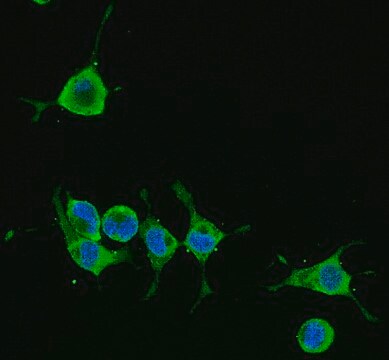MAB348-AF647
Anti-APP A4, a.a. 66-81 of APP {NT} Antibody, clone 22C11, Alexa Fluor™ 647 Conjugate
clone 22C11, from mouse, ALEXA FLUOR™ 647
Sinónimos:
Amyloid beta A4 protein, ABPP, Alzheimer disease amyloid protein, Amyloid precursor protein, APP, APPI, Cerebral vascular amyloid peptide, CVAP, PN-II, PreA4, Protease nexin-II, PN-II, N-APP, Soluble APP-alpha, S-APP-alpha, Soluble APP-beta, S-APP-beta,
About This Item
Productos recomendados
biological source
mouse
Quality Level
conjugate
ALEXA FLUOR™ 647
antibody form
purified antibody
antibody product type
primary antibodies
clone
22C11, monoclonal
species reactivity
canine, porcine, rat, fish, human, monkey, mouse
technique(s)
immunocytochemistry: suitable
isotype
IgG1
NCBI accession no.
UniProt accession no.
shipped in
wet ice
target post-translational modification
unmodified
Gene Information
human ... APP(351)
General description
Application
Quality
Immunocytochemistry Analysis: A 1:100 dilution of this antibody detected APP A4 in SH-SY5Y cells.
Target description
Other Notes
Legal Information
¿No encuentra el producto adecuado?
Pruebe nuestro Herramienta de selección de productos.
Storage Class
12 - Non Combustible Liquids
wgk_germany
WGK 2
flash_point_f
Not applicable
flash_point_c
Not applicable
Certificados de análisis (COA)
Busque Certificados de análisis (COA) introduciendo el número de lote del producto. Los números de lote se encuentran en la etiqueta del producto después de las palabras «Lot» o «Batch»
¿Ya tiene este producto?
Encuentre la documentación para los productos que ha comprado recientemente en la Biblioteca de documentos.
Nuestro equipo de científicos tiene experiencia en todas las áreas de investigación: Ciencias de la vida, Ciencia de los materiales, Síntesis química, Cromatografía, Analítica y muchas otras.
Póngase en contacto con el Servicio técnico







